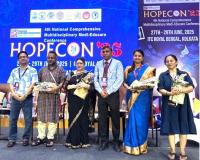Indian Scientists Propose Development of World's Smallest Angstrom-Scale Semiconductor Chips

New Delhi, April 20 – A team of 30 scientists from the Indian Institute of Science (IISc) has proposed to the Indian government the development of Angstrom-scale semiconductor chips, which would be significantly smaller than the currently smallest chips in global production.
As per agency report, the proposal outlines a plan to utilize a new class of semiconductor materials known as ‘2D materials’ to manufacture ultra-miniaturized chips. These Angstrom-scale chips would be nearly one-tenth the size of the smallest chips currently being produced globally, potentially placing India at the forefront of next-generation semiconductor technology.
At present, the global semiconductor industry is dominated by silicon-based technologies led by countries like the United States, Japan, South Korea, and Taiwan. In contrast, the IISc-led initiative aims to leapfrog current standards by deploying advanced materials such as graphene and transition metal dichalcogenides (TMDs) to create 2D semiconductors.
According to sources, the IISc team submitted a detailed project report (DPR) to the Office of the Principal Scientific Adviser (PSA) to the Government of India in April 2022. A revised version was submitted in October 2024, and later shared with the Ministry of Electronics and Information Technology (MeitY). The proposal calls for the creation of Angstrom-scale chips using atomic-scale materials and outlines a roadmap for indigenous technology development in this frontier field.
Officials from MeitY confirmed that discussions on the project are underway and that the ministry views the proposal positively. Senior officials, including the PSA and MeitY Secretary, have held meetings to evaluate the scope and potential of the technology. The ministry is also exploring practical electronic applications where this breakthrough could be implemented.
India currently relies heavily on foreign firms for semiconductor manufacturing, a strategic sector crucial to both economic development and national security. One of the country’s major ongoing projects is a semiconductor fabrication facility being developed by Tata Electronics in partnership with Taiwan’s Powerchip Semiconductor Manufacturing Corporation (PSMC), involving an investment of Rs 91,000 crore. This project is part of the India Semiconductor Mission and qualifies for 50 percent capital support from the government.
In comparison, the IISc-led proposal seeks Rs 500 crore over five years to develop next-generation semiconductor technology indigenously. The plan includes a phased funding approach aimed at achieving technological self-reliance after the initial development stage.






